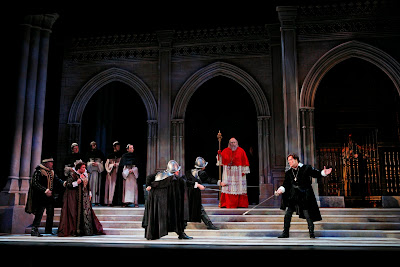 Kevin Short as Philippe II, Reyna Carguill as Elisabeth,
Kevin Short as Philippe II, Reyna Carguill as Elisabeth,Jeffrey Tucker as the Grand Inquisitor, and Gustavo Lopez
Manzitti as Don Carlos, in the Sarasota Opera’s
current production of Verdi’s Don Carlos.
(Photo by Richard Termine)
By Rex Hearn
SARASOTA — Don Carlos is about Philip II, the 16th-century king of Spain, and his fight with the forces of the Inquisition.
This Spanish story was commissioned by the Paris Opera, and written in French, though it was based on a German play by Friedrich Schiller and given to Italy’s greatest opera composer, Giuseppe Verdi, to set. Small wonder that this sprawling work, which premiered in a five-act French version in 1867, is known as Verdi’s problem opera.
No fewer than eight authentic versions, in French and Italian, exist today. Verdi himself cut it for the Naples opening in 1872, translating it into Italian. Up to 1884, he made drastic revisions to the score, wryly commenting: “Seeing that my legs have to be cut off, I prefer to sharpen and wield the knife myself.”
Opera cognoscenti largely agree that the original French libretto meshes more smoothly with Verdi’s original music. The version I heard at the Sarasota Opera earlier this month was the uncut French four-act version of 1884, lasting four hours. The company plans to produce the original five-act version later in its complete Verdi cycle.
Don Carlos, heir to the Spanish throne, is angry that his widowed father, King Philip (here, Philippe), has married Carlos’ secret love, Princess Elisabeth of France. In the role of Don Carlos, Argentinian tenor Gustavo Lopez Manzitti was most impressive. He attacked each aria with brio, in a voice that rang with stentorian tones. Manzitti also demonstrated flexibility and fine musicianship as he navigated through some of Verdi’s most challenging writing for solo voice.
He confesses his love for Elisabeth to his friend Rodrigue, who is in service to his father. Sung by Italian baritone Marco Nistico, this Rodrigue was memorable for fine acting and beautiful singing. Nistico’s baritone is effortless in its delivery, a joy to hear. His solid portrayal showed a rare stage presence that was calm throughout and brilliant in its interpretation.
Bass-baritone Kevin Short as Philippe, who is unaware of his son’s love for Elisabeth, was indeed kingly. His mellifluous timbre carried through the house like a thunderbolt, getting even stronger in his Act III confrontation with red-robed Grand Inquisitor, played by Jeffrey Tucker.
Tucker’s threats to the king were masterfully delivered with a ringing bass voice. The Grand Inquisitor is careful to tell the king how to treat his rebellious son, who is arrested for vowing to free the people of Flanders from his father’s despotic rule, but warns him that Rodrigue is the real danger. This duet shows how the veteran composer influenced the shaping of the text by the French librettists, Joseph Mery and Camille du Locle.
Princess Eboli, the queen’s lady-in-waiting, poses as the queen and tricks Don Carlos into a declaration of love. With her mask off, the prince realizes his error, but the secret is out. Soprano Stella Zambalis sang a very convincing Eboli, and in her last aria, as she is banished from the court, her lovely dramatic voice delivered enough power to nearly overwhelm the orchestra. This fine piece of singing was met with rapturous applause.
As Elisabeth, the 27-year-old Reyna Carguill, who was singing the role on one month’s notice, gave it a good reading on opening night. Hers is naturally a young voice, but it has enormous potential. Carguill paced herself well, delivering a fantastic Toi qui sus le neant in Act IV that had the audience on its feet.
In the comprimario roles the the standout was Marie D’Amato, an accomplished actress with a sweet soprano, playing Thibault, a pants role.
Stephanie Sundine’s stage direction showed complete understanding of the singers’ needs, and also clever crowd movement, probably because she gives each chorus member a role to play as well as sing, which made for lively stagecraft.
The sets, designed by David P. Gordon, were magnificent. The Sarasota Opera stage is small by most theatrical standards, but Gordon is able to make it look as large and imposing as this opera requires.
Howard Kaplan’s costumes were right in keeping with the period, Ken Yunker’s lighting designs were dazzling, and Georgianna Ebehard’s makeup work was thankfully not overdone. Chorus Master Roger Bingaman drilled his choristers beautifully; this is perhaps one of the best choruses I have heard in my operagoing years.
Company chief Victor DeRenzi led a fine 70-piece orchestra in the pit and also supplied unusually good English surtitles for this complicated story.
One of the reasons so many versions were made of this opera is undoubtedly that so much of the action is driven by human emotion, and Verdi felt he needed to use all of Schiller’s stage business to create that action. Whatever the reason, Sarasota’s Don Carlos is a stunning production that ought not be missed.
Rex Hearn is the founder of the Berkshire Opera Company, the only professional summer opera company in Massachusetts, which has just completed its 24th season. He has been reviewing opera in southern Florida since 1995.
Don Carlos can be seen four more times: At 7 p.m. Thursday, March 19; 1:30 p.m. Sunday, March 22; 7 p.m. Wednesday, March 25; and 7 p.m. Saturday, March 28. The Sarasota Opera House is at 61 N. Pineapple Ave. in downtown Sarasota. Tickets range from $45-$115. For more information, call the box office at 941-366-8450, ext. 1, or visit www.sarasotaopera.org.